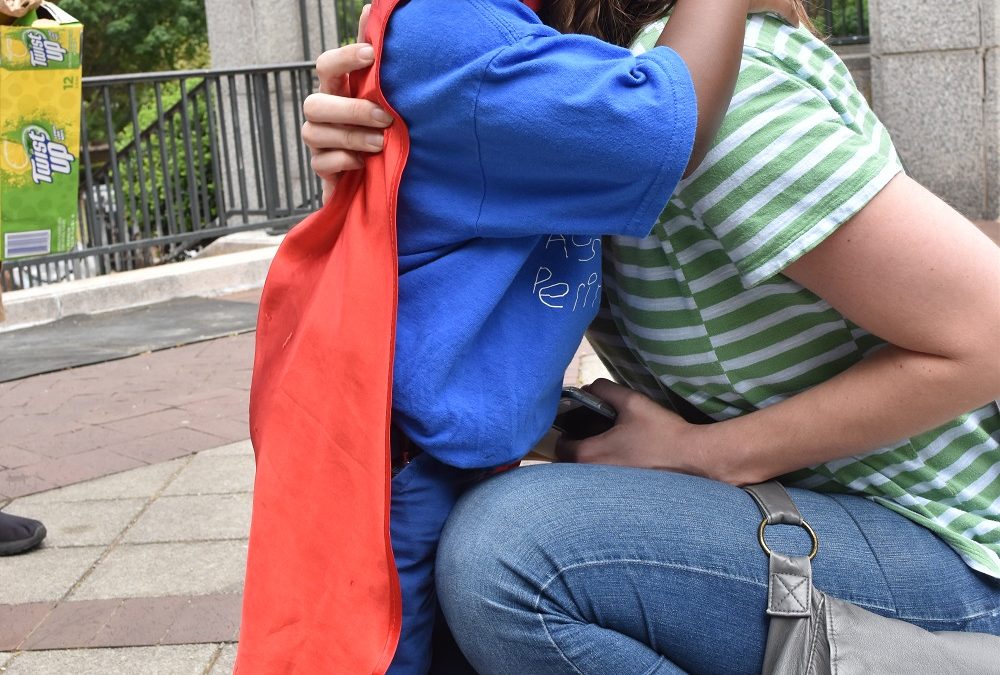A 4-Year-Old Superhero Emerges
A 4-Year-Old Superhero Emerges
 In 1976, during the spring semester of my freshman year in college, I got in my car and drove to the local Western Union office. When I walked in, I told the clerk at the counter that I wanted to send a telegram. At that time, a telegram was a written message that was sent by telegraph from one Western Union office to a Western Union office in a different city. The second Western Union office would then make arrangements to hand-deliver the message to the intended recipient.
In 1976, during the spring semester of my freshman year in college, I got in my car and drove to the local Western Union office. When I walked in, I told the clerk at the counter that I wanted to send a telegram. At that time, a telegram was a written message that was sent by telegraph from one Western Union office to a Western Union office in a different city. The second Western Union office would then make arrangements to hand-deliver the message to the intended recipient.
The telegram that I sent was to my sister Colleen, who was a senior in high school. She was in the school musical, and the purpose of the message was to wish her luck on the opening night of the play. I gave the clerk at Western Union specific instructions as to when and where to deliver the message. The message was fewer than 25 words.
The cost to send the message was more than $20. Because of inflation, the cost to deliver that same message today would be more than $89.
Now, more than 40 years after I sent that Western Union telegram, millions of personal messages are sent every day between people on their smartphones. Because of the availability of email and text messaging, Western Union discontinued all telegram and commercial messaging services on January 27, 2006.
I thought about Western Union and the telegram that I sent to my sister recently when I read about how in August 1964 Dean Martin, a famous American singer, actor, and comedian, had sent a telegram to Elvis Presley that read, “If you can’t handle the Beatles, I’ll do it for you.”
Martin was poking fun at Elvis because one of Martin’s songs — “Everybody Loves Somebody” — had become so popular that it replaced the Beatles’ song “A Hard Day’s Night” as the number one song on the charts.
Ironically, “Everybody Loves Somebody” was not on the list of songs that Martin had planned on recording for his upcoming album “Dream with Dean.” The list included 11 songs, which Martin recorded. But then his conductor and piano player, Ken Layne, told him that he needed one more song to complete the album. Layne then suggested that Martin sing “Everybody Loves Somebody.” Martin liked the idea and recorded the song with backup guitars, drums, and Layne playing the piano.
The public reaction to the song was so overwhelming that Martin quickly rerecorded the song for a single release, with a full orchestra and background singers. Shortly thereafter, “Everybody Loves Somebody” took over the number one slot on both the Billboard Hot 100 and the Pop Standard singles charts. The song became so identified with Martin that the words “Everybody Loves Somebody” are etched into his grave marker in Los Angeles.
There’s a 4-year-old boy in Birmingham, Alabama, who would probably like Dean Martin’s old song. His name is Austin Perine. Once a week, Austin puts on a red silk cape and uses his weekly allowance to purchase sandwiches that he hands out to homeless people. He calls himself a superhero and wants to someday be the president of the United States.
A story that was published last month on CNN.com explained what inspired Austin to feed the homeless:
“Austin is just a compassionate kid,” the boy’s proud dad says. “He just wants to see everybody happy.”
That compassion is centered around Austin’s older brother Taylor, 16, who struggles with autism. “He’s always been a nurturer of his brother,” Perine says. “He’s kind of like a little dad to him.”
In March, that compassion sparked an emotional response to a baby panda Austin saw on TV.
“Austin and I were watching an animal show and there was a mother panda that was leaving her cubs,” recalls Perine. “Austin began to get concerned, and I told him that the panda would be homeless.”
Austin didn’t know the meaning of the word “homeless.”
“And my dad said, it’s somebody who doesn’t have a home or mom and dad around,” [Austin] says.
Austin’s dad later took him to visit a homeless shelter. Upon seeing the people in the shelter, Austin asked, “Can we feed them?” His dad said yes and took him to Burger King, where they purchased some chicken sandwiches. Austin told his dad that he wanted to pay for the sandwiches with his allowance.
Word quickly spread about the 4-year-old “superhero.” The local newspaper and TV stations ran news stories about him, and there were several people who wrote about him on social media. The company that owns the local Burger King then announced that it was going to give $1,000 worth of food and drinks to Austin every month for a year so he could expand his mission.
Austin’s dad told the CNN reporter that he and Austin would like to someday “build a facility that addresses the many causes of homelessness — mental illness, drug abuse, addiction, and things like that.”
Ever since Austin started handing out sandwiches, he has offered the same advice to every person he has come into contact with: “Don’t forget to show love.”
The standard definition of “love” is “a strong affection for another arising out of kinship or personal ties.” The definition of the type of love that Austin is showing toward his neighbors is “unselfish, loyal, and benevolent concern for the good of another.”
All love is derived from the love that God has for each and every one of us. Without God’s love, it would be impossible for any of us to love another person. Dean Martin was probably correct when he pointed out that everybody loves somebody, but he failed to mention that the only reason we are able to love anyone is because of the love that God has for us.
When Austin tells the homeless people, “Don’t forget to show love,” the people he is talking to don’t realize that it would be impossible to show love toward anyone if God didn’t love each one of them.
What’s the greatest way God has shown his love for us? He became man and sacrificed His life so each one of us would have an opportunity to enter into His Kingdom. His sacrifice required that He endure the ultimate form of suffering — crucifixion and death on a cross.
When you sacrifice for someone, you are required to give up or surrender something for the sake of the other person, which always results in some form of suffering on your part. True love requires sacrifice, and sacrifice requires suffering. Sacrifice and suffering are interchangeable. They mean the same thing. Sacrifice = Suffering.
I am not a fan of suffering. I would prefer to avoid it all costs. But I know that in order to love another person, I must be willing to sacrifice and endure the suffering that is an integral part of sacrificing for another person.
We live in a culture where the word “love” has, in many respects, lost its true meaning.
More on this topic next week.





2 Comments
Dear Georgette and Harry –
What a beautiful account of a little boy who taught others the true meaning of LOVE. I know a very loving couple who have also taught others the true meaning of LOVE – their names are Georgette and Harry Williams! This couple will be celebrating their 38th Wedding Anniversary on June 15, 2018. They’ve taught the true meaning of love – and sacrifice – to each of their children as well as to many others (including me) through Perpetual Adoration daily, wherever they are and through meaningful weekly publications that are freely distributed by them. So –
congratulations to both of you, my dear Friends! With loving prayers. Sister Roberta, CSJ
Sister Roberta – Thank you for your kind message. I thought of you when I wrote the “Everybody Loves Somebody” article because you sacrifice (and suffer) daily for the benefit of the members of your community who rely on you for physical, emotional, and spiritual support. You have willingly allowed God’s love to pass through you for the benefit of the other members of your community. God bless you. Love, Harry